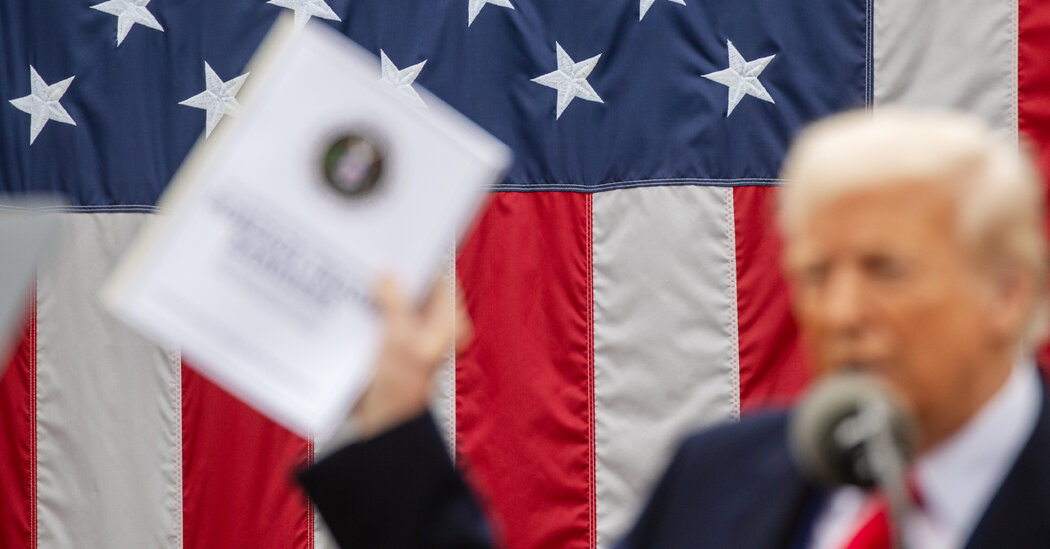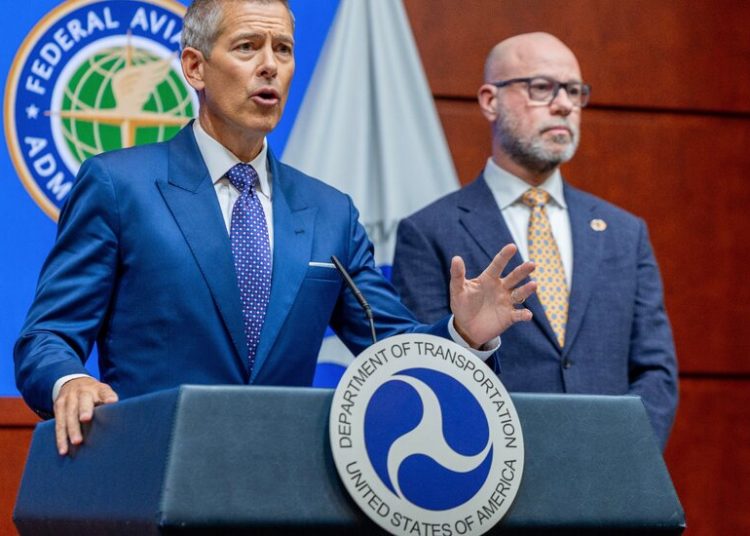On Wednesday the Supreme Court heard oral arguments about the legality of President Trump’s tariffs. Earlier this week, the president said that “if a President was not able to quickly and nimbly use the power of Tariffs, we would be defenseless, leading perhaps even to the ruination of our Nation.”
The outcome has vast implications — for the global economy, American businesses, the government’s budget and consumers, not to mention implications for the separation of powers of the federal government.
Some legal scholars have argued that the administration exceeded its authority in enacting the tariffs without authorization from Congress. Jack Goldsmith, a Harvard Law School professor and former top Justice Department lawyer under George W. Bush, said in September that the case is a close call. In an online interview, John Guida, an editor in Times Opinion, dug into the case with Goldsmith — and what oral arguments revealed about the justices’ thinking on it. This interview has been edited for clarity.
John Guida: When the Supreme Court agreed to take the tariff case, you suggested that it was close — but that President Trump had the better argument and should win on what you called pure legal grounds. Before we dig into Wednesday’s oral arguments, can you explain why?
Jack Goldsmith: The International Emergency Economic Powers Act (IEEPA) gives the president very broad economic powers, including the authority to “regulate” the “importation” of foreign property, in order to deal with an “unusual and extraordinary threat” from outside the United States.
The central issue is whether the president’s authority to regulate “importation” of goods includes the power to impose tariffs on the goods. It is natural to read tariffs as a form of regulating imports. And in fact, a lower federal appeals court interpreted those very words in 1975 to uphold a 10 percent import duty that President Richard Nixon imposed under the predecessor law to IEEPA. When Congress passed IEEPA in 1977, it kept the same “regulate” “importation” language in the statute. A congressional report in IEEPA indicated that lawmakers were aware of the earlier court interpretation of “regulate” “importation” in passing IEEPA.
President Trump determined that the tariffs were needed in order to deal with the “unusual and extraordinary threat” of illicit drug inflows and global trade imbalances. This understanding of “threat” is well within presidential practice, and a president typically receives significant deference from courts on such determinations.
Let’s turn to Wednesday’s oral arguments. The word “skeptical” (or variations of it) comes up in a lot of reporting to characterize the justices’ questioning of the government. Did anything surprise you or change the way you are thinking about the case?
I think that it is fair to say that the justices the government needs to win the case — Chief Justice John Roberts and Justices Neil Gorsuch and Amy Coney Barrett — asked the government very hard questions that did express skepticism about important elements of its case. But they also asked the other side very hard questions. I do not think any of these three tipped off their hands definitively. I did not find anything terribly surprising in the questions.
You didn’t mention Justice Brett Kavanaugh.
His line of questions — especially his basic agreement with the government’s reading of a case called Algonquin — suggested to me that he is leaning toward ruling for the government.
What else stuck out to you in terms of lines of questioning?
One important line came from Justice Gorsuch, who through argument and government concessions seemed to establish two important points. First, the government’s IEEPA argument is massively broad and would allow a different president to impose a 50 percent tariff on gas-powered cars and auto parts to address a climate change emergency originating abroad. This and other questions established that the government’s arguments entailed sweeping power under IEEPA over the national economy.
Second, there are effectively no checks on this power. Congress as a practical matter cannot rein it in, since to do so it would have to override an inevitable presidential veto with two-thirds majorities in both chambers of Congress, which it will not foreseeably be able to do. The bottom line implication for me was that the court, if it buys the government’s arguments, must accept that presidents will have this enormously broad, multifaceted economic power basically forever.
To try to tease that out a bit, maybe we can take a hypothetical. Let’s say the government prevails in this case. Someone runs for office and wins on the platform that he or she will slash taxes for Americans but also promises bold new spending programs, all paid for by revenue from IEEPA tariff revenue. In this scenario, no congressional approval is required for that revenue. Is that plausible? And if it is, what would it mean for the integrity of the separation of powers?
It is plausible. The government tried to resist this conclusion by distinguishing between a revenue-based tariff, which it was not arguing for under IEEPA, and a tariff that had a regulatory aim (like fighting drug importation) but incidentally raised revenue, which is what it said Trump’s tariffs did. To me this distinction has two problems. An IEEPA tariff that aimed to raise revenue could easily be recharacterized as one designed for regulation, which means the distinction is meaningless. Second, President Trump and members of his administration have bragged about how much deficit-slashing revenue the IEEPA tariffs are bringing in, so I am not sure how much this argument works for the government in this case.
As for the separation of powers implications, it would entail that the government could, under the guise of the broad delegation of power in IEEPA, raise enormous amounts of revenue through effective taxes under the guise of regulating a foreign emergency. This implication, combined with what Justice Gorsuch called the “serious retrieval problem” (i.e., Congress not being able to rein in this power), is the most serious big-picture argument against the president.
Two judicial doctrines came up repeatedly at oral arguments. One — the “nondelegation doctrine” — has a longer pedigree than the other, the “major questions doctrine.” First, how did the nondelegation doctrine shape the discussion and debate on Wednesday?
The nondelegation doctrine is the idea that there are limits on Congress’s power to delegate its legislative power to the president. The government argued that this doctrine did not apply with much force in this case because the tariffs implicated the president’s inherent foreign affairs power. This argument got crushed. Justice Gorsuch, preceded by similar questions from Justice Elena Kagan, got the government to concede that the president does not “have inherent authority over tariffs in peacetime.” The government argued as a fallback that the delegation was guided by the normal “intelligible principle” test, but it garnered little attention.
The major questions doctrine says that Congress must use clear language to authorize executive actions with vast economic and political significance. How did that shape the questioning?
No one can deny that these tariffs have vast economic significance, so the major questions doctrine came up throughout the argument. The government offered three basic reasons it shouldn’t apply. First, the legislation concerned inherent presidential power — an argument that Justice Kagan challenged early in strong terms and that Justice Gorsuch also disputed in the delegation context. Second, the court often applies the major questions doctrine to government action that is “unheralded.” Here the government had a decent argument that the tariffs were not unheralded because, as explained, “regulate” “importation” argument for tariffs was previously made and accepted in an earlier related context. Third, that in this emergency context the doctrine does not apply because we would expect Congress to confer broad powers on the president, an argument that has some case law support. I could not glean from the argument how the court will come down on the major questions doctrine, but some justices suggested that it would be crucial in resolving the case.
We have covered some of the arguments against the government. What were some of the best arguments, or lines of questioning, that would favor the government’s position?
There is a powerful argument of reading regulates “importation” to include tariffs in light of standard principles of interpretation and a previous interpretation of that language to include tariffs. While Justice Barrett was skeptical of the government’s claims in other places, she made very strong arguments that the best reading of IEEPA included a presidential power to impose regulatory tariffs. Other justices focused on ways IEEPA’s text could support the government’s arguments.
My sense from the case — I must emphasize that it was just an overall sense — was that it would be decided based on how the court applies the major questions doctrine, which is basically what I have thought since May.
You have written a lot about presidential power — and repeatedly expressed concern about its expansion over decades by modern presidents of both parties. Justice Gorsuch warned on Wednesday about “a one-way ratchet toward the gradual but continual accretion of power in the executive branch and away from the people’s elected representatives” in Congress. Do you think the two doctrines, separately or together, will (or at least should) act here as a guide toward some form of restraint or limitation in the way the justices decide the case?
The major questions doctrine is much more promising as a potential constraint. The promise of the doctrine is that it can prevent presidents from overreading statutory authorizations to do things far beyond what Congress plausibly contemplated. The skepticism about the doctrine has been that the court has applied it so far to rein in progressive Democratic policies. So Republicans have for the most part supported the doctrine and Democrats opposed it. In this case, the tables are turned in a very high-stakes context. The case presents the court with an opportunity to show that the doctrine has real bite as a constraining force on all presidential excess.
Justice Barrett asked about the reimbursement process if the tariffs are invalidated: “It seems to me like it could be a mess.” Neal Katyal, a lawyer who spoke on behalf of one group of challengers, described a variety of procedures in trade law for achieving that, which Justice Barrett characterized as “a mess.” Do you think that will have a big, or any, bearing on the court’s decision? Is that something for lower courts to sort out?
I do not have a confident answer. I thought the remedies question would come up more than it did; only Justices Barrett and Samuel Alito raised it. The worry is that a ruling against the administration could have a massive economic impact if all tariff revenues must be returned. Katyal offered several ways to alleviate the concern, including a stay on the remedy to give Congress time to sort it out, or perhaps (much more controversial) a decision to make the court’s ruling prospective only.
Bottom line, any guess as to how you see the court ruling on the president’s tariffs? Or at least how to think about the odds one way or another?
In the piece you alluded to above I said that I thought the government had the better of the technical legal argument, but that I could not predict the outcome with any confidence because the major questions doctrine’s proper application remains uncertain and because “consequences of this case are too big in too many directions — a win or a loss for Trump has massive economic and political consequences, not to mention important legal implications for future presidencies.”
I am in the same basic place after oral argument, alas. But if I had to predict nonetheless, I think a majority of the court will be very worried, as mentioned above, about giving a president basically unconstrained tariff authority to raise revenue that Congress as a practical matter cannot reverse. It will be hard, I think, for five justices to bless that conclusion. And I think the secretary of the Treasury has made it easier for the court to avoid doing so by claiming in recent weeks that the administration can continue imposing tariffs based on other narrower and somewhat “more cumbersome” authorities that can nonetheless be “effective.” That concession effectively lowered the stakes of the court’s ruling against the president.
Jack Goldsmith, a law professor at Harvard, a nonresident senior fellow at the American Enterprise Institute and a former assistant attorney general, is an author, with Bob Bauer, of “After Trump: Reconstructing the Presidency” and the newsletter Executive Functions. John Guida is an editor for Times Opinion.
The Times is committed to publishing a diversity of letters to the editor. We’d like to hear what you think about this or any of our articles. Here are some tips. And here’s our email: [email protected].
Follow the New York Times Opinion section on Facebook, Instagram, TikTok, Bluesky, WhatsApp and Threads.
The post Why It Will Be Hard for Five Justices to Bless Trump’s Tariffs appeared first on New York Times.




